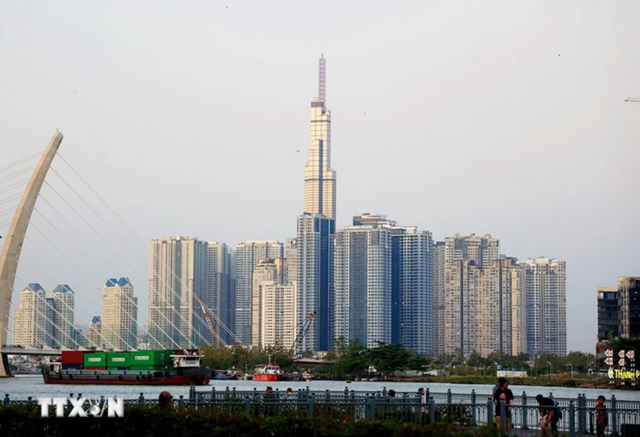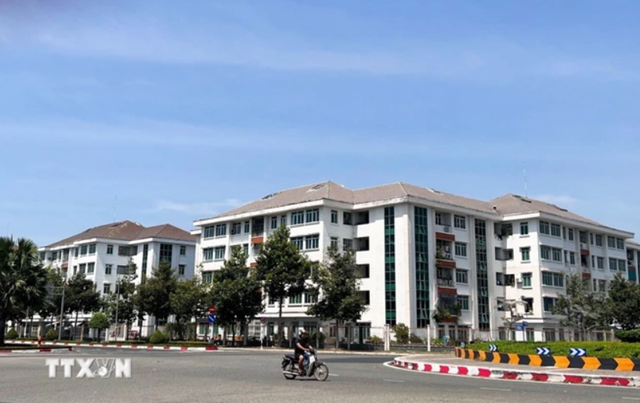
Source: VNA
|
The Vietnam Real Estate Brokers Association (VARS) predicts that, on the back of numerous positive factors, while the new laws are taking effect, the real estate market will continue its sustainable recovery and improve over time. By the end of the year, the recovery of the real estate market will show clear progress.
Currently, the economic growth surpasses the proposed scenario, credit escapes the “gloomy” situation, the interest rate remains low, and public investment disbursement is continuously promoted…
At the same time, the 2024 Land Law, the 2023 Housing Law, the 2023 Real Estate Business Law, and Clause 2, Article 209 of the Law on Credit Institutions will take effect from August 1st, five months earlier than previously decided, which will definitely have a positive impact and contribute to the recovery and development of the real estate market – VARS experts analyze.

Mr. Trần Đình Thiên, member of the Prime Minister’s Economic Advisory Group, said that the new laws will definitely have a positive impact and contribute to the recovery and development of the market. This is because these laws were drafted during a period when the market was facing difficulties and aimed to thoroughly address these challenges.
The effort to resolve bottlenecks is reflected in the recently passed laws, although they have not met expectations, they will surely have a positive impact.
According to Mr. Nguyễn Văn Đính, Chairman of VARS, when the related laws take effect, the wait-and-see psychology will be removed. Project developers will start racing to untie knots with government agencies.
As a result, investors will be more confident in releasing their products. Investors are encouraged, and the due money in banks will flow into real estate. Brokers and brokerage firms actively improve their capabilities, recruit and train their staff, and comply with new regulations.
The recovery will continue to vary across segments and regions, but the degree of differentiation will be more even.
Regarding the housing segment, based on the early enforcement of the new laws, the government, along with ministries, sectors, and localities, continuously promote the recovery of the real estate market, and project developers will “release” their products with more vibrant communication activities.
VARS’s survey shows that the supply in the second half of 2024 is expected to improve, estimated to increase by about 20% compared to the first six months of 2024, mainly contributed by the luxury apartment segment with improved product quality and selling prices.
Low-rise products will also be offered more as mega projects are in their final stages of completion and enter the market. Most of the new subdivisions and projects are located in the outskirts of cities and surrounding provinces of the two special municipalities, Hanoi and Ho Chi Minh City.
The demand for buying houses for living will continue to remain high, along with a recovery in investment demand of about 30% compared to the beginning of the year, targeting new markets. The potential for price increases will drive transaction volume to continue to rise.
The number of transactions is expected to increase by about 20% compared to the first half of the year, as the supply is expected to “surge” only at the end of the year, still mainly contributed by the apartment segment – VARS forecasts.
The secondary market’s liquidity will also improve and show the most positive changes at the end of the year when the efforts of government agencies and real estate businesses bear fruit. The number of “views” and purchases will also increase.
The primary supply of apartments, mainly luxury ones, is increasing. Apartment prices in projects with an average price of around 40 million VND/sqm will continue to rise but at a slower pace, ranging from 100 to 300 million VND/unit.
Transactions and selling prices of villas, townhouses, and shophouses will also improve on a large scale, especially in the secondary market, thanks to the previous recovery foundation and investors’ expectations of higher profits.
Notably, experts predict that land prices will bottom out and gradually regain their position as the “king” of investment channels. However, investors will only target auctioned land, subdivided lots, areas with complete infrastructure, and reasonable price levels.
The social housing segment is expected to turn around as the new regulations in the laws take effect, aiming to remove difficulties and obstacles for enterprises and social housing buyers; and the credit package of 120,000 billion VND is amended towards more favorable conditions.
The bright spot remains in the industrial real estate segment with good growth momentum along with the land fund acquisition activities of corporations to develop industrial parks. Sustainable industrial park models will also be promoted to develop green and circular economy, increase value chains, meet demands, and create competitive advantages to attract sustainable investment flows.
The supply of tourism and resort real estate is expected to improve, with more enterprises “daring” to launch their products, but the number is not significant as the general real estate market has not really prospered. Many projects are still on hold due to legal and financial difficulties. Therefore, the primary supply will mainly be high-rise projects valued at less than 5 billion VND.
Condotel products (condo-hotels) will continue to lead the primary and secondary tourism and resort real estate markets, creating stable cash flow with a reasonable investment value. They are especially boosted by the development of the tourism industry and the expectation of a more complete legal framework. Meanwhile, the villa and shophouse resort segment is likely to continue competing with products on the secondary market.
VARS forecasts that, along with the market recovery, the subjects will also start “accelerating” their participation in the market and promoting their business plans. The new laws will definitely bring positive impacts to the market but will also act as a “filter” to eliminate unqualified subjects from the game.
The new regulations will tighten real estate brokerage activities, eliminating “amateur” brokers who are not truly committed to the profession. Especially, the regulations on the land fund for the development of commercial housing projects, the removal of the land price framework, etc., will gradually screen out investors with weak capabilities, finances, and land funds from the market.
In the past time, many enterprises successful in production have “entered” the real estate investment field with the expectation of super profits, but the results have not met expectations. Therefore, many enterprises are now in a “damned if you do, damned if you don’t” situation due to the inadequacy in the calculation of land use fees, which makes it difficult for enterprises to anticipate the costs.
Especially in the future, when the new laws take effect, the new land price will be higher, which means higher land use fees, higher compensation for people, and more pressure on enterprises in terms of available capital.
Therefore, VARS believes that in the future, the market will only have room for well-established investors with large land funds, good financial resources, and capable of developing large-scale urban projects with synchronous infrastructure and utilities. At the same time, they can take advantage of their strengths to reduce investment costs effectively.
Thu Hằng





![[Photo Essay]: Experts, Managers, and Businesses Unite to Forge a Path Towards Sustainable Green Industry](https://xe.today/wp-content/uploads/2025/07/z678592918-150x150.jpg)


![[Photo Essay]: Experts, Managers, and Businesses Unite to Forge a Path Towards Sustainable Green Industry](https://xe.today/wp-content/uploads/2025/07/z678592918-100x70.jpg)






